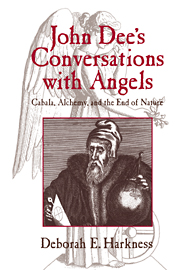Book contents
- Frontmatter
- Contents
- List of Illustrations
- Acknowledgments
- List of Abbreviations and Conventions
- Introduction
- Part I Genesis
- Part II Revelations
- 4 “Then Commeth the Ende”: Apocalypse, Natural Philosophy, and the Angel Conversations
- 5 “The True Cabala”: Reading the Book of Nature
- 6 Adam's Alchemy: The Medicine of God and the Restitution of Nature
- Epilogue
- Select Bibliography
- Index
6 - Adam's Alchemy: The Medicine of God and the Restitution of Nature
Published online by Cambridge University Press: 05 May 2013
- Frontmatter
- Contents
- List of Illustrations
- Acknowledgments
- List of Abbreviations and Conventions
- Introduction
- Part I Genesis
- Part II Revelations
- 4 “Then Commeth the Ende”: Apocalypse, Natural Philosophy, and the Angel Conversations
- 5 “The True Cabala”: Reading the Book of Nature
- 6 Adam's Alchemy: The Medicine of God and the Restitution of Nature
- Epilogue
- Select Bibliography
- Index
Summary
Behold, I show you a mystery;
We shall not all sleep, but we shall all be changed,
In a moment, in the twinkling of an eye, at the last trump: for the trumpet shall sound, and the dead shall be raised incorruptible, and we shall be changed.
Corinthians 15:51–52Once he had attained mastery of the divine language and the cabala of nature, Dee believed that he was in a better position to discern and decipher corruptions in the Book of Nature. While this might have satisfied some natural philosophers, Dee conceived a much greater role for natural philosophy in the improvement of the human condition. The question facing him in the 1580s and 1590s was how to practice natural philosophy in a deteriorating world. This question was answered, and the final aspect of Dee's newly revealed natural philosophy took shape, when the angels delivered to him a form of alchemy that had not been practiced since the days of Adam.
Much of the rationale behind Dee's alchemy, both before and during the angel conversations, was linked to his belief in a “sickness” affecting the Book of Nature. Yet humanity was unable to diagnose or cure the Book of Nature without divine help, for alchemy itself had decayed and was unable to restore Nature's health. With the angels' assistance, Dee believed that he could restore the art of alchemy and then bring about a restitution of nature.
- Type
- Chapter
- Information
- John Dee's Conversations with AngelsCabala, Alchemy, and the End of Nature, pp. 195 - 214Publisher: Cambridge University PressPrint publication year: 1999



